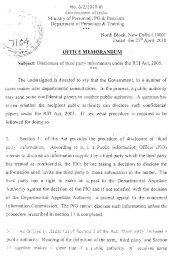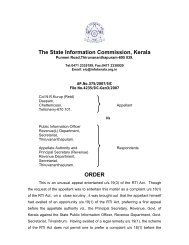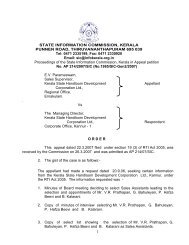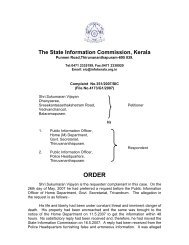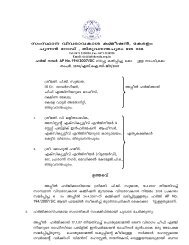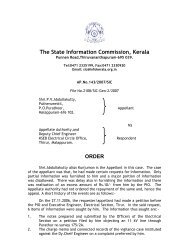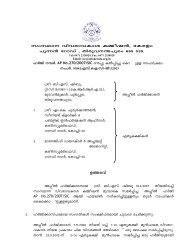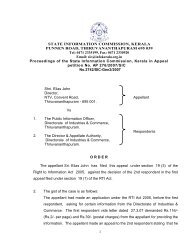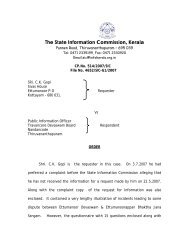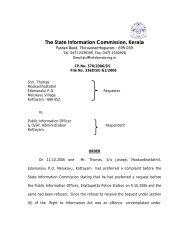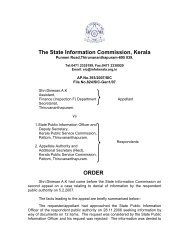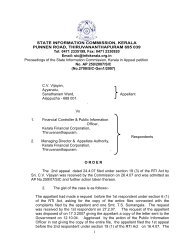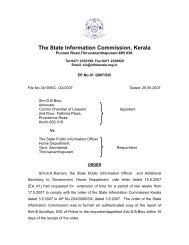Shri K.K Sadanandan Vs. (1) PIO, General Admn. - RTI
Shri K.K Sadanandan Vs. (1) PIO, General Admn. - RTI
Shri K.K Sadanandan Vs. (1) PIO, General Admn. - RTI
Create successful ePaper yourself
Turn your PDF publications into a flip-book with our unique Google optimized e-Paper software.
The State Information Commission, KeralaPunnen Road,Thiruvananthapuram-695 039.Tel:0471 2335199, Fax:0471 2330920Email: sic@infokerala.org.inAP.No.208/2007/SICFile No.1814/SIC-Gen3/2007<strong>Shri</strong>.K.K.<strong>Sadanandan</strong>,Kizhake Kuniyil House,Thalakulathur.P.O,Kozhikode District.Public Information Officer,<strong>General</strong> <strong>Admn</strong>. (Spl.A) Department,Govt. Secretariat.,Thiruvananthapuram.The Appellate Authority/ (First Appeal Officer),Additional Chief Secretary,<strong>General</strong> <strong>Admn</strong>. (Spl.A) DepartmentGovt. Secretariat,Thiruvananthapuram.FINAL ORDER<strong>Vs</strong>AppellantRespondentsIn continuation of the order dated 2.8.2007, this Commission makes thefollowing final order.The details of the case, its chronological developments, whether thematter falls within the exempted item of Section 8(1) (i) of the <strong>RTI</strong> Act were alldiscussed in detail in the preliminary order dated 2.8.2007. The matter wasadjourned with the following observation."The Appellate Authority during the course of the personal hearing hadsubmitted before the Commission that he had certain bits of information towhich access was not provided to him. The Commission directed the <strong>PIO</strong> to
procure the document viz., the bits of information and personally present thesame in a sealed cover before the Commission within 10 days of receipt of thisorder".Accordingly, the <strong>PIO</strong> Mr.Unnikrishnan Unnithan, Joint Secretary of the<strong>General</strong> Administration (Special) Department appeared before the Commissionand had produced a sealed envelope. The envelope was opened in the openCommission sitting. It was seen that it contained only a copy of theproceedings of the Council of Ministers dated 5.6.2002 concerning transfer ofIAS Officers. The case of <strong>Shri</strong>.T.O.Sooraj.IAS, posted as District Collector,Kozhikode was one among the transfer and postings so decided by the Councilof Ministers. There was no other information provided. The <strong>PIO</strong> furthersubmitted during the hearing that he was not in possession of any otherinformation other than the one provided before the Commission vide its orderdated 2.8.2007 on AP No.208/2007/SIC. It had also been observed by theCommission that a copy of the Govt. Order issued pursuant to the Council ofMinister's decision on 5.6.2002 had been provided to the requester/appellant,<strong>Shri</strong>.K.K.<strong>Sadanandan</strong>, on 17.1.2007 itself after collecting Rs.10/- as the cost ofproviding the information. An intimation to remit Rs.10/- to receiveinformation was sent to the requester on 17.1.2007 which the appellant sayswas received by him only on 10.2.2007 as verified from the seal and records ofthe postal department. In the meantime, he had filed the first appeal beforethe Appellate Authority on 7.2.2007 which was received by the AppellateAuthority on 20.2.2007. The <strong>PIO</strong> had delayed in providing the information asborne out from the records. He had taken more than 30 days - the period oftime allowed to provide the information, to communicate the requester toremit fees for obtaining the information and further it was dispatched only on2.2.2007. So there was a deliberate act on the part of the <strong>PIO</strong> to delay inproviding the information. The requester/appellant received thecommunication only on 10.2.2007 by which time he had filed the first appeal.The first appeal was seen to have been decided on 9.3.2007. The AppellateAuthority in his letter had mentioned that the S<strong>PIO</strong> had asked him to remit thecost for obtaining the information and requester/appellant hadn't remitted thefee thereto. In any case, the <strong>PIO</strong> could not have asked any cost in as much ashe had himself delayed in providing the information and had clearly exceededthe maximum permissible limit of 30 days.The Appellate Authority had raised certain issues - "regarding other bitsof information, I regret to inform you that these are not available at presentwith this authority". Pursuant to which the <strong>PIO</strong> was asked to provide the 'bitsof information' which were kept away from the Appellate Authority by hissuperior officers. Now the Commission observed that there was no "bits ofinformation" kept away from the Appellate Authority and, therefore,Commission is constrained to observe that the various contentions taken by theAppellate Authority in his letter while disposing off the appeal was not borneout of facts. With regard to his contention that it was covered under Section2
8(1) (j) of the <strong>RTI</strong> Act "it is seen that the other bits of information requestedfor relate to personal information, the disclosure of which has no relationshipto any public activity or interest, or which would cause unwarranted invasionon the privacy of the individual. Moreover, this authority is not satisfied thatthe larger public interest justifies the disclosure of such information. Noprovisions are seen by this authority which compels the disclosure of suchinformation to the Parliament or a State Legislature, either by convention or byrules".In the final analysis, the position taken by the Appellate Authority istotally unacceptable to the Commission and his various contentions hadqueered the pitch. The Commission observes that there was delay on the partof the <strong>PIO</strong> and who has since retired from service and do not propose to takeany coercive steps against him on the ground that he was not in the know ofthings and hadn't had a clear understanding of the provisions of the <strong>RTI</strong> Act.The Commission, would, however, observe that more attention and seriousnesshave to be paid in dealing with the request(s)/appeal(s) coming under the <strong>RTI</strong>Act, 2005 by all concerned. The information provided in the sealed cover shallalso be furnished to the appellant within 10 days of the receipt of this order,though it was only a duplicate of the order already furnished.Issue No.2:Inter alia, the Appellate Authority had raised two questions during thecourse of the personal hearing. The first one was a submission to dismiss thecase since the appellant was ex-parte in the proceedings. This is a quiteunwanted submission by the appellate authority and also against all knownprinciples of jurisprudence. The appellant was absent but was not set exparte.The <strong>RTI</strong> Act is a new legislation of the Parliament which provides twoappeal forums in the Act. The first appeal forum is the appellate authorityrather the officer senior in rank of the same department. The secondappellate forum is the State Information Commission. In a second appeal, thewell settled position of law is that the appeal should be disposed off only onmerit and not by any other method. Order IX of the Civil Procedure Code dealswith ex-parte proceedings and the manner and the effect of setting one partyas ex-parte. It is a privilege conferred exclusively on the Judicial Fora toproceed even in the absence of one party remaining absent. The consequencesare very severe. If the plaintiff is absent, the plaint itself is lost by dismissal.If the defendant is absent the plaintiff gets an ex-parte decision against thedefendant. But the prerogative whether one should be set ex-parte or not,rests with the Court and it is not for any one to suggest that some one may beset ex-parte. Unlike other statutes, the <strong>RTI</strong> Act, Section 18 (3) had made itspecifically clear that the procedure for the trial of the suit contemplated inthe Civil Procedure Code was applicable to the proceedings before the SIC.The unambiguous declaration of Sub-section 3 of Section 18 regarding theapplication of the provision of Civil Procedure Code could make it further clearthat this Commission was specially empowered under the Civil Procedure Code3
in the manner in which a trial had to be conducted or an enquiry had to beconducted. The contention of the Appellate Authority was that theproceedings should have been dropped or an appeal should have beendismissed, consequent to the absence of the appellant/requester. He wascanvassing for a position like dismissal of the appeal. The ex-parte proceedingsenable the court or the judicial forum to proceed further even in the absenceof one party. Declaring one person or one party, the appellant or therespondent, as ex-parte is a prerogative vested with the Commission. It is aprivilege and discretion of the Commission. Absence alone does notautomatically invite the consequences of setting one ex-parte. The <strong>RTI</strong> Act isfor furnishing of information and not for penalization/providing relief. To setex-parte means to make a judicial pronouncement that in the absence of eitherof the party, the court or the Commission is taking a view. Moreover, inrespect of the <strong>RTI</strong> Act, it is up to the appellant to be present and his nonpresencewill not or should not end up in throwing the case overboard, ascontented by the first appellate authority. The Appellate Authority, therefore,had gone wrong in making such a submission.The Appellate Authority was hostile even at the very idea of summoningthe Appellate Authority by the Commission. The Appellate Authority wassummoned by invoking the inherent powers of the Commission. The order ofthe Appellate Authority was being challenged and principles of natural justiceprovides for an opportunity of hearing the Public Information Officer and alsothe Appellate Authority because the order of the Appellate Authority is alsobeing challenged before the Commission. To make it further clear, Section19(1) of the <strong>RTI</strong> Act, is the provision for the Appellate Authority to hear theappeal. Section 19(3) reads that "a second appeal against the decision underSub-Section (1) shall lie................. to the SIC". The appeal is against theorders of the Appellate Authority and hence the Appellate Authority can besummoned. It should be noticed that the Appeal Rules notified by the Govt. ofKerala vide Notification No.27774/Cdn.5/2006/GAD dated 31.5.2006 (S.R.ONo.412/2006) is a clear statutory provision compelling the appearance of thePublic Information Officers and Appellate Authorities, if the Commission sodesires. Rule 5 (i) and (iv) reads as follows. This rule promulgated by theGovt. of Kerala was in strict conformity with Section 19 sub-section (3) of the<strong>RTI</strong> Act.Rule 5(1) .....reads"(i) take oral or written evidence on oath or on affidavit from theconcerned or interested persons:(ii), (iii) .....(iv) hear the State Assistant Public Information Officer or State PublicInformation Officer or such senior officer who had decided the first appeal orsuch person against whom the appeal is made, as the case may be; ".This rule read along with Section 19(3) makes it amply clear that theCommission has got every right and authority under law and practice to4
summon the appellate authority for a personal hearing. It is all the morenecessary because in a proceedings under the <strong>RTI</strong> Act, the Appellate Authority,is a necessary party, and necessarily, he is the respondent.It was surprising to note that the Additional Chief Secretary of the Stateof Kerala and the Appellate Authority had the audacity to present before theCommission that the Commission has no jurisdiction to summon an AppellateAuthority and he appeared under protest. Through out, the Commissionobserved a confused mind and poor application of Rules and practices, and theCommission, most charitably, absolve him, attributing the entire episode toappellant's inherent mental make up and demeanour.To conclude, the <strong>PIO</strong> shall serve copy of the information requested bythe appellant within 10 days of the receipt of this order and report complianceto the State Information Commission.Dated this on the 29th day of October, 2007.Authenticated copySecretary to Commission5



